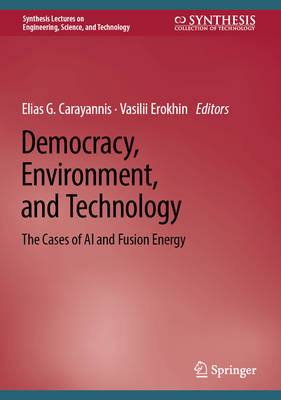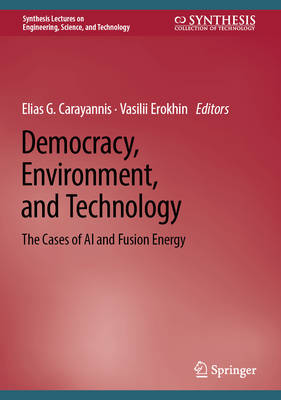
- Afhalen na 1 uur in een winkel met voorraad
- Gratis thuislevering in België vanaf € 30
- Ruim aanbod met 7 miljoen producten
- Afhalen na 1 uur in een winkel met voorraad
- Gratis thuislevering in België vanaf € 30
- Ruim aanbod met 7 miljoen producten
Zoeken
Democracy, Environment, and Technology
The Cases of AI and Fusion Energy
€ 68,95
+ 137 punten
Omschrijving
The 21st century is witnessing an unprecedented convergence of transformative technologies that promise to reshape global energy systems, governance, and societal well-being. Among these, Public Interest Technology (PIT), Artificial Intelligence (AI), and Fusion Energy stand out as critical domains with the potential to drive sustainable development, economic growth, and equitable progress. This book explores the concepts of PIT, AI, and Fusion, in ten chapters. It begins by tracing the evolution of PIT, emphasizing its role in addressing global challenges through socio-technical frameworks. Key themes include the ethical and practical challenges of PIT, such as data privacy, algorithmic bias, and funding barriers, as well as its potential to drive equitable solutions. The importance of stakeholder inclusion, particularly from the Global South, and frameworks to manage uncertainties in technology investments are highlighted. Case studies illustrate successful PIT implementations, such as AI-driven sustainability projects and fusion energy initiatives, while underscoring the need for interdisciplinary collaboration and adaptive governance. The later chapters focus on fusion energy as a PIT advocating for open science, international cooperation, and flexible investment strategies to overcome technical and financial hurdles. In these chapters, ideas that fusion energy, if developed inclusively, could revolutionize global energy systems and combat climate change are discussed, and governance models, such as international commissions and public-private partnerships, to ensure equitable access and ethical development are proposed. Similarly, discussions on AI stress its dual potential to either exacerbate inequality or democratize opportunities, depending on policy and implementation.
Specificaties
Betrokkenen
- Uitgeverij:
Inhoud
- Aantal bladzijden:
- 430
- Taal:
- Engels
- Reeks:
Eigenschappen
- Productcode (EAN):
- 9783032031266
- Verschijningsdatum:
- 27/09/2025
- Uitvoering:
- Hardcover
- Formaat:
- Genaaid
- Afmetingen:
- 168 mm x 231 mm
- Gewicht:
- 816 g

Alleen bij Standaard Boekhandel
+ 137 punten op je klantenkaart van Standaard Boekhandel
Beoordelingen
We publiceren alleen reviews die voldoen aan de voorwaarden voor reviews. Bekijk onze voorwaarden voor reviews.







